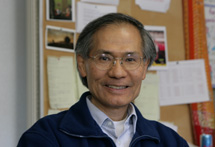
Handy Links
SLAC News Center
SLAC Today
- Subscribe
- Archives: Feb 2006-May 20, 2011
- Archives: May 23, 2011 and later
- Submit Feedback or Story Ideas
- About SLAC Today
SLAC News
Lab News
- Interactions
- Lightsources.org
- ILC NewsLine
- Int'l Science Grid This Week
- Fermilab Today
- Berkeley Lab News
- @brookhaven TODAY
- DOE Pulse
- CERN Courier
- DESY inForm
- US / LHC
SLAC Links
- Emergency
- Safety
- Policy Repository
- Site Entry Form

- Site Maps
- M & O Review
- Computing Status & Calendar
- SLAC Colloquium
- SLACspeak
- SLACspace
- SLAC Logo
- Café Menu
- Flea Market
- Web E-mail
- Marguerite Shuttle
- Discount Commuter Passes
-
Award Reporting Form
- SPIRES
- SciDoc
- Activity Groups
- Library
Stanford
Around the Bay
Patrick Lui, International Educator
"I'm a bit of a scatterbrain," says Patrick Lui. But his work in the SLAC Technology Transfer department would suggest that Lui is hardly unfocused. "Well, I have a lot of interests," he clarifies. "There are just so many options!" Lui says having so many interests makes him a cheerleader for multidisciplinary education. Two years ago, his interest in science education prompted him to discuss with a friend the possibility of starting an international school in his native Hong Kong to teach students about the interconnectedness of science, technology and society. Last summer, Lui's idea became a reality, and a resounding success.
"In teaching, we can't lose sight of the interplay between complementary disciplines," says Lui. "Science plays such an important role in modern society." Lui says he has always enjoyed teaching. He taught for four years during graduate school, actively participated in the SLAC tours program and stays connected with the SLAC Education Department.
Some years ago, Lui learned about the Center for Talented Youth Summer Program at Johns Hopkins, an international summer school geared toward pre-college students. Stanford University hosts a similar program, offering challenging curriculum for gifted students, lessons in critical thinking and strong global and scientific themes. This model resonated with Lui. He thought China should have a similar program. Lui, who regularly returns to Hong Kong, pitched the idea to a friend connected to the faculty at Hong Kong University of Science and Technology, or HKUST. His friend became so enthusiastic about the idea that she quickly pushed through a proposal, working with HKUST faculty, to start the program. Just two years later, Lui traveled back to Hong Kong to teach a class in the first year of the HKUST talented youth summer program titled "Societal Development through Science and Technology."
The program welcomed 60 high school juniors and seniors, ages 17 and 18, from 13 countries. The school requires each student to have academic standing in the 95-percentile in their school, but they need not be studying a scientific field. The students chose one of four electives, among them Lui's class, "Global Climate Change and Energy," and attended one core class called "Science, Technology and Society in the Industrial Age and the Information Age."
In his class, Lui set the stage for unique debates and discussions among the international students. His focus on global warming put the spotlight on the U.S. and China as major contributors to carbon dioxide emissions in the atmosphere. "It becomes a moral issue," says Lui. "For example, the Chinese government wants to quadruple the gross domestic product, but only double energy consumption from 2000 to 2020. But it is becoming clear that they are using more energy. Yet 75% of China's people live in poverty, so how can you tell them to stop raising the standard of living of their people?" The students, he says, actively discussed the issue from different sides and tried to decide on a course of action. In another debate about Germany's strict carbon dioxide policy, Lui had the students discuss whether or not other countries should adopt such a strict standard. "I was so happy that we came naturally to such discussions. These kids will be leaders one day and we're preparing them to think about interconnectivity."
Another important aspect of the school for Lui was teaching critical thinking, or the Socratic Method. Lui says the students agreed this was one of the most powerful lessons they took away from the school. This philosophy of always asking questions is taught in most American English classes, but Lui says it is not as common in Europe and almost non-existent in pre-college curriculum in Asia.
Using English as a common language, the students lived, learned and played together for three weeks, attending lectures, discussions, homework sessions, as well as lots of recreational activities. One weekend the students went on a scavenger hunt through Hong Kong, à la The Amazing Race. They also had plenty of time for rock climbing, archery, soccer, campus lab visits, field trips, and an opportunity to meet Stanford Nobel laureate Douglas Osheroff.
Lui says he was happy to see so much time dedicated to having fun, even if the students had a heavy workload as well. The students seemed to agree, giving positive feedback to the program as a whole. Lui received the highest student review of any teacher, and has been invited back for next year's session. He dedicated more than 450 hours constructing the GCCE class curriculum, and says he's already busy updating it for next year. "Climate change isn't a static topic," he says. "I have to start getting ready."
—Calla Cofield
SLAC Today, October 29, 2008
